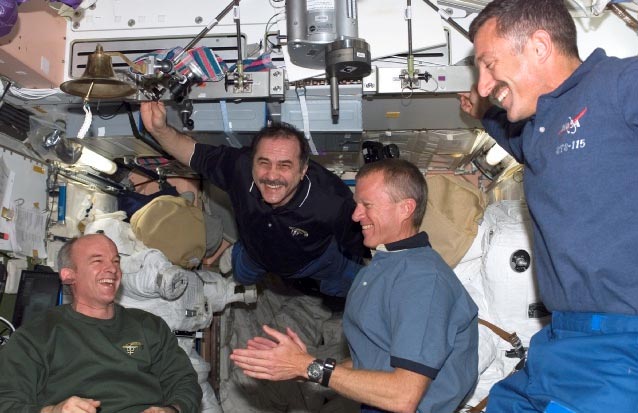Busy Time for ISS Crew Continues After Shuttle's Departure

This story was updated at 12:01 p.m. EDT.
HOUSTON - For three astronauts aboard the International SpaceStation (ISS), the busy season does not end with the successfuldeparture of six astronauts aboard NASA's shuttle Atlantis today.
Just hours after Atlantis undockedfrom the ISS at 8:50 a.m. EDT (1250 GMT) today, Expedition13 commander Pavel Vinogradov and flightengineers JeffreyWilliams and ThomasReiter are already looking forward to the arrival of their next humanvisitors and the departure of a faithful robotic cargo ship over the next fourdays.
"This is a unique situation," NASA'sdeputy ISS program manager Kirk Shireman said of theconfluence of spacecraft visiting the Expedition 13 crew. "They are going to beworking extremely hard until the time they come home...it's going to be busy."
A Russian-built Soyuz TMA-9spacecraft is slatedto launch the next ISS crew - Expedition14 commander MichaelLopez-Alegria and flight engineer Mihkail Tyurin - at 12:09a.m. EDT (0409 GMT) Monday with U.S. entrepreneur Anousheh Ansari, a paying ISSvisitor, aboard.
"It's a tricky choreography," said Daria Lopez-Alegria, wife ofExpedition 14 commander Michael Lopez-Alegria, in aNASA interview at Baikonur Cosmodromein the Central Asian steppes of Kazakhstan, where her husband is set to launch."It's unbelievable that we can manage the schedule like that."
About eight hours later, theExpedition 13 crew will jettison the unmanned Russian cargo ship Progress21 from its berth at the end of the space station's Zvezdaservice module so the incoming Soyuz will have a docking port when it arriveson Sept. 20 - the same day Atlantis is slated to land at NASA's Kennedy SpaceCenter in Florida.
Get the Space.com Newsletter
Breaking space news, the latest updates on rocket launches, skywatching events and more!
Paul Dye, NASA's lead shuttle flightdirector for Atlantis' STS-115 mission, said the shuttle and ISS crews got asmall break when image analysts determined that a second look at the orbiter'sheat shield - known as a focused inspection - would not be necessary. Thedecision allowed the orbiter to undock Sunday, rather than Monday.
"If we had stayed an extra day, wehad a traffic management plan that would have taken a spirographto show you," Dye said Saturday.
The Atlantis STS-115 crew, commandedby veteranshuttle astronaut Brent Jett, spent about six days of their planned 11-daymission docked at the ISS to deliver a $372million pair of 17.5-ton trusses and new power-generating solar wings tothe orbital laboratory.
"This is probably as busy as it'sever been aboard the International Space Station," NASA astronaut Michael Fincke, who served a six-month tour aboard the ISSduring 2004'sExpedition 9, told SPACE.com.
Altogether three spacecraft will beflying either to or away from the ISS within four days of one another.
"Pavel andI will be busy until we're resting on the steppes of Kazakhstan, I guess," Williams saidjust after Atlantis launchedtoward the ISS on Sept. 9.
Vinogradov and Williams will return to Earthon Sept. 28 with Ansari after an eight-day crewchange with the Expedition 14 crew. Reiter, who joined Expedition 13 during aJuly shuttle visit by NASA'sSTS-121 astronauts aboard the Discovery orbiter, will stay on as anExpedition 14 flight engineer until his relief arrives in December.
"We haven't had to do anythingunreasonable," NASA's ISS program manager Michael Sufferdinisaid of the scheduling for Vinogradov and Williams,who unlike Reiter must pack their bags to return to Earth on top of all theirother duties. "You have to remember, when [Atlantis's crew] leaves, immediatelythe Soyuz is coming up, and that represents a ride home for those guys."
Williams has spent about an extrahour working each day, shuttle officials said.
Shireman said the last shuttle flight to theISS that overlapped with an arriving Soyuz occurred during NASA's STS-100mission in 2001, but some top NASA officials believe handling multiplespacecraft like Soyuz, Progress, shuttleand the ISS willbecome more common in the future.
"I think it is pretty indicative ofwhat we are going to have in the future here," William Gerstenmaier,NASA's associate administrator for space operations, said last week. "So, at sometime, we will have the Progress free-flying, we will have the Shuttlefree-flying, and we will have the Soyuz free-flying, as well as the station. Sothere is going to be a lot of spacecraft in orbit around there to keep trackof."
Gaining experience in suchspacecraft traffic control, Gerstenmaier said, willbe vital for future exploration.
"When we aregoing to go pickup the lunar activity and then eventually some of the Mars stuff, thesekind of skills of learning to operate multiple vehicles, again, in space and dorendezvous and [proximity operations], they are going to be critical for thoseactivities," he added.
- New Gallery: STS-115 Spacewalks
- Gallery: STS-115: Atlantis's Launch Day
- Complete Space Shuttle Mission Coverage
- NASA's STS-115: Shuttle Atlantis to Jump Start ISS Construction
- The Great Space Quiz: Space Shuttle Countdown
- Complete Coverage: ISS Expedition 13
Join our Space Forums to keep talking space on the latest missions, night sky and more! And if you have a news tip, correction or comment, let us know at: community@space.com.

Tariq is the Editor-in-Chief of Space.com and joined the team in 2001, first as an intern and staff writer, and later as an editor. He covers human spaceflight, exploration and space science, as well as skywatching and entertainment. He became Space.com's Managing Editor in 2009 and Editor-in-Chief in 2019. Before joining Space.com, Tariq was a staff reporter for The Los Angeles Times covering education and city beats in La Habra, Fullerton and Huntington Beach. In October 2022, Tariq received the Harry Kolcum Award for excellence in space reporting from the National Space Club Florida Committee. He is also an Eagle Scout (yes, he has the Space Exploration merit badge) and went to Space Camp four times as a kid and a fifth time as an adult. He has journalism degrees from the University of Southern California and New York University. You can find Tariq at Space.com and as the co-host to the This Week In Space podcast with space historian Rod Pyle on the TWiT network. To see his latest project, you can follow Tariq on Twitter @tariqjmalik.









